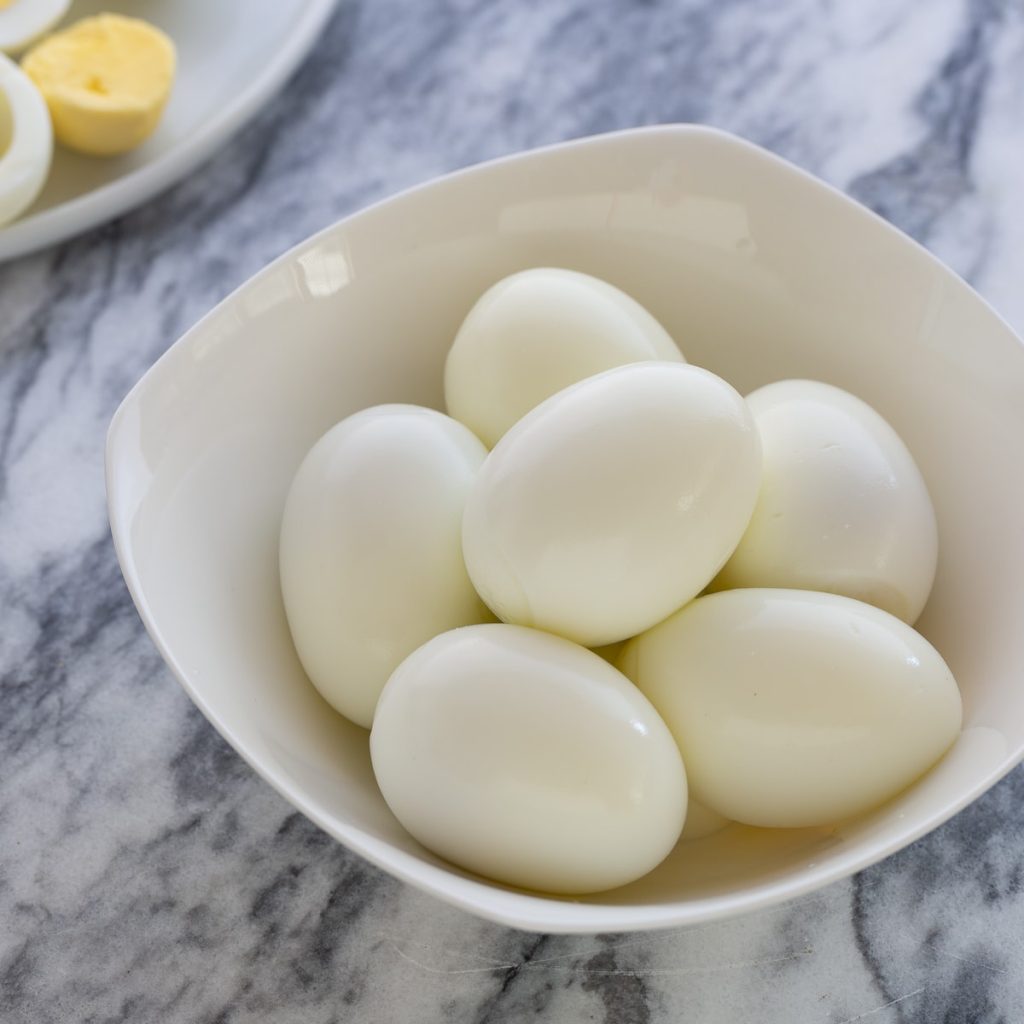
Step 1: Start with the Right Eggs
Chefs recommend using older eggs for hard boiling. Fresh eggs tend to be harder to peel, while eggs that are 7-10 days old have slightly looser membranes, making them easier to peel after boiling.
Tip: If you don’t know the age of your eggs, you can test them. Fill a bowl with water and gently drop the eggs in. If they sink to the bottom and lay flat, they’re fresh. If they stand upright or float, they’re older and better for boiling!
Step 2: Bring the Eggs to Room Temperature
Cold eggs straight from the fridge can crack when placed in hot water. To prevent this, chefs suggest bringing the eggs to room temperature by letting them sit out for 10-15 minutes before boiling.
Pro Tip: If you’re short on time, place eggs in a bowl of warm water for about 5 minutes to quickly bring them to room temperature.
Step 3: Prepare the Water
In a large pot, fill with enough water to cover the eggs by about an inch or so. Place the pot on the stove over medium-high heat and bring the water to a boil.
Chefs often prefer a gentle boil to avoid cracking the eggs, so once the water starts boiling, reduce the heat to a simmer.
Pro Tip: Add a pinch of salt to the water. Some chefs believe this helps prevent the shells from cracking, while others say it makes peeling easier.
Step 4: Gently Lower the Eggs Into the Water
To avoid cracking, chefs recommend using a slotted spoon to gently lower the eggs into the simmering water. Alternatively, you can use a small bowl to carefully lower the eggs one at a time into the pot.
Important: Be careful not to overcrowd the pot. The eggs should have enough space to move around freely as they cook.
Step 5: Timing is Everything
Once the eggs are in the water, bring the water back to a gentle simmer (not a rolling boil). Then, immediately start timing. Chefs typically recommend the following times depending on how you like your yolks:
- Soft-boiled (slightly runny yolk): 4-5 minutes
- Medium-boiled (slightly set yolk): 6-7 minutes
- Hard-boiled (fully set yolk): 10-12 minutes
For a perfect hard-boiled egg, 10 minutes is generally considered the sweet spot, resulting in firm whites and creamy yolks without any gray ring around the edges.
Pro Tip: For a more precise result, use a timer rather than watching the clock yourself, as boiling times can vary slightly based on egg size and altitude.
Step 6: Shock the Eggs in Ice Water
After the eggs have reached your desired cooking time, it’s crucial to stop the cooking process. The best way to do this is by immediately transferring the eggs to an ice water bath. This not only stops the cooking but also helps prevent that unsightly green-gray ring around the yolk.
Fill a large bowl with ice and water and submerge the eggs for at least 5 minutes. This also helps with the peeling process, as the egg contracts slightly from the shell.
Step 7: Peel the Eggs
Once the eggs are cooled, it’s time to peel them. To make peeling easier, gently tap the egg on a hard surface to crack the shell, then roll it lightly to loosen the shell. Starting from the wider end, where there’s usually an air pocket, peel the shell off.
If you’re having trouble peeling, you can peel the eggs under a small stream of water to help remove stubborn bits of shell.
Chef’s Tip: To make peeling even easier, you can crack and roll the egg gently in the bowl to create small fractures all over the shell. You can also try using the edge of the sink to assist in loosening the shell.
Bonus Tips for Perfection:
- Use a Timer: Even if you’re experienced, timing is key. A kitchen timer or smartphone timer will ensure that your eggs come out perfect every time.
- Avoid Overcooking: Overcooking the eggs is the most common mistake. It leads to a rubbery texture and that unwanted greenish-gray ring around the yolk.
- Storage: If you’re not using the eggs immediately, store them in their shells in the refrigerator for up to a week. Peeled eggs can be stored in an airtight container for 3-4 days.
- Flavor Boost: For extra flavor, try adding spices or seasonings directly to the water, such as a pinch of cayenne or garlic powder. This subtly infuses the egg’s outer layer with extra flavor.
Conclusion
Chefs have perfected the art of boiling eggs with their precise timing, cooling techniques, and careful handling. By following these steps, you can achieve consistently perfect hard-boiled eggs with minimal effort.
Whether you’re preparing a salad, making deviled eggs, or enjoying them as a snack, hard-boiled eggs can be a healthy and satisfying option. With the right approach, you can have eggs that are perfectly tender, easy to peel, and delicious every time.